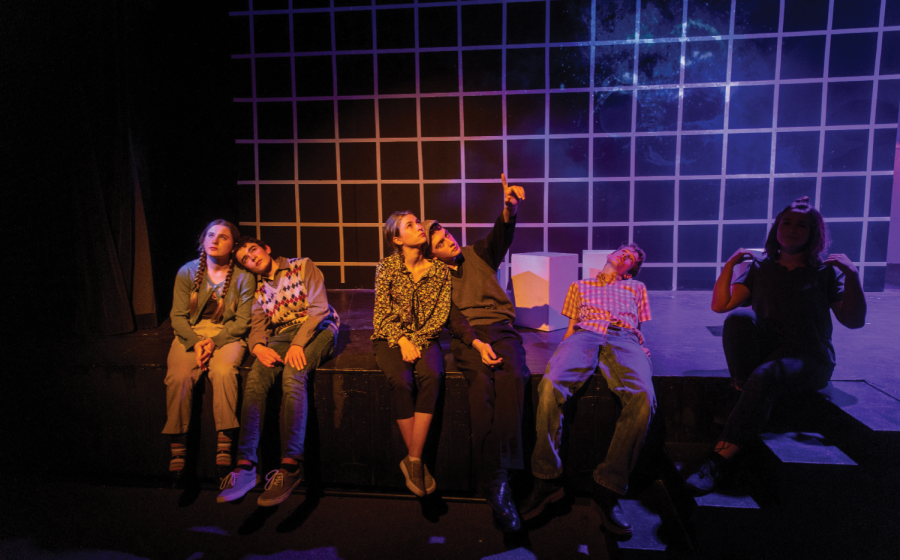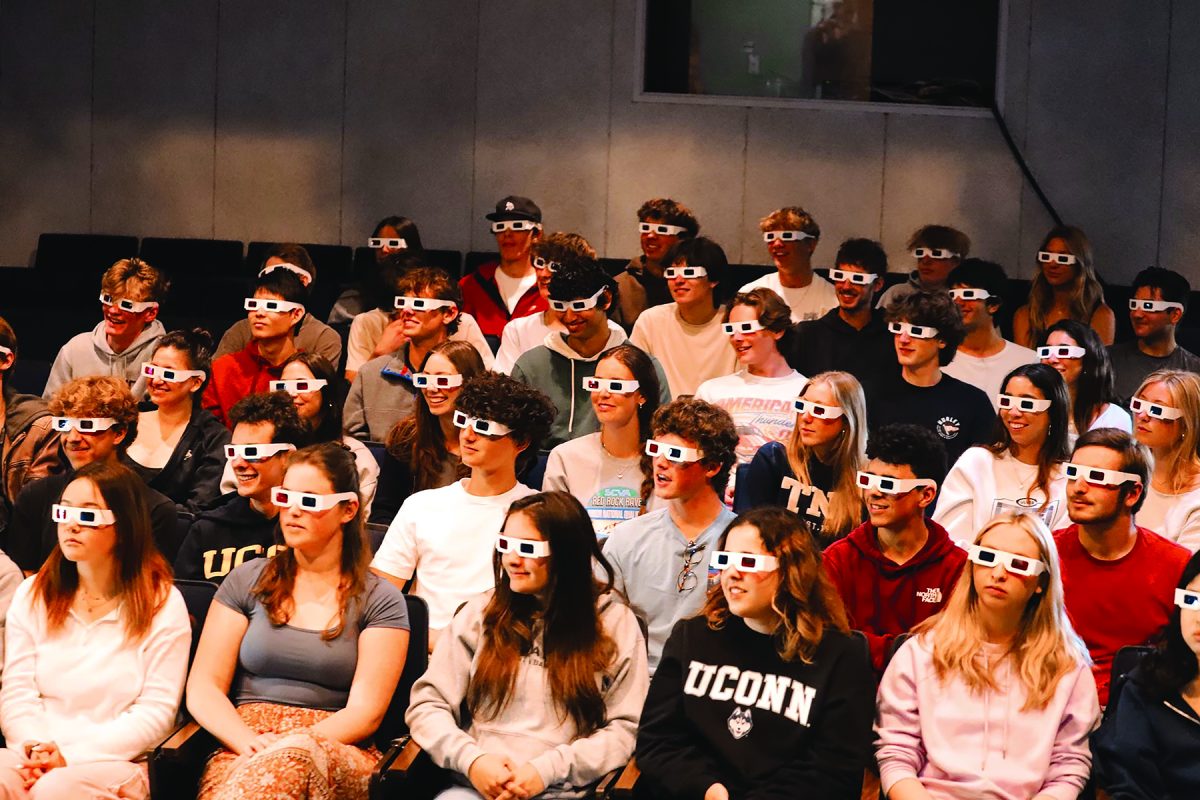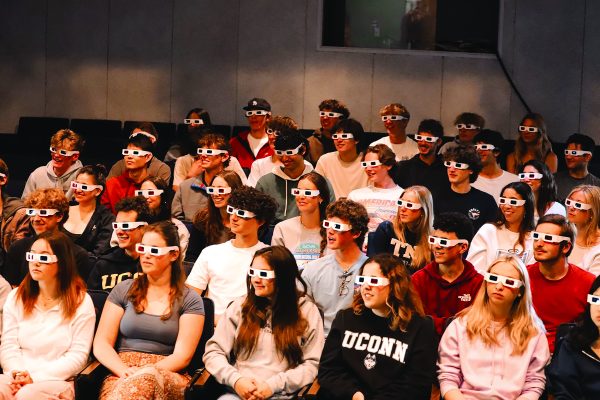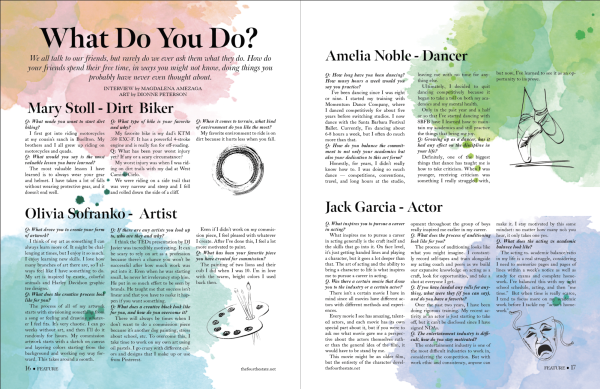Theatre Kids; Beyond the Curtain
April 9, 2023
The journey of self discovery, the relationship between student and teacher, the traumatic events, and the great accomplishments are all key aspects of the spectacular production “The Curious Incident of the Dog in the Night-Time.” Brought to life by an outstanding cast, crew, and director, the 2023 Play Production class received praises from the audience on opening night. “I really enjoyed the story and the visuals,” said Junior Nikki Mielcarek, echoing other viewers,” I could tell everyone put a lot of effort into it.”
This coming-of-age story portrays the highly intelligent 15-year-old Christopher Boone, an isolated boy who is ill-equipped to handle social life. Christopher goes on a thrilling journey to solve the mystery of a neighbor’s murdered dog, with the guidance of his teacher, Siobhan.
“The relationship we see on stage between Christopher and his teacher Siobhan is a cornerstone in the very foundation of this story,” said Theater director and performing arts chair Dana Caldwell
This production, produced by both middle and upper schoolers, reflects the outstanding creativity and teamwork of the theater department. Laguna Blanca has two main theater productions, the winter play and the spring musical. While the play is part of an elective class and has designated rehearsal time during school, the musical is entirely an after school activity. While students spend the beginning stages of creating the play in their class periods, as the premier night gets closer, students spend time outside of class perfecting their performance.
While the play rehearsal times are built into the school days for the most part, an average of 20 hours cast-rehearsal time and 40 hours crew all-calls—crew work days—are spent outside of class.
Sophomore Eleanor Crafton, who played the characters “Mrs. Shears” and “Punk Girl,” comments on the connection cast members build with each other. “Rehearsals are really a bonding experience. We’ll go through a scene with our script in hand and we’ll all contribute ideas on what might work for a scene,” Eleanor said.
For the play, the bulk of rehearsals are called “blocking rehearsals.” In blocking rehearsals, the cast begins with table work where they read and analyze the text and get to know their characters. Extensive chunks of rehearsal are spent on choreographing and coordinating while the cast memorize their lines independently. The final step of the play is carried out by the crew, who bring in all the technical elements to bring the play to life. The crew members build and paint sets, hang and program the lighting, find and record sound cues, put mics on the actors, assemble projections, gather props, create costumes, and move sets around the stage. “Because we as crew members aren’t typically seen during the show, it’s important to know that without us, the show would not go on,” said Senior Zola Peltz, a stage manager and deck captain.
According to Caldwell, this show was the most technically-demanding show that the department has ever seen. The team had to learn entirely new equipment during the production process, with lots of new lighting and projection.
The many different crew jobs, ranging from standard deck crew to stage managers in the booth and back stage, all have an equal role of bringing the play to life. Eighth-grader Cooper Green, the play’s lighting assistant, spent most of his time running concessions and operating the fog machine.
“The tech crew and cast find ways to make the little things feel like a blast. Everything from actors messing up lines in a funny way, to making a little too much fog,” Cooper said. Tech week, the week before the opening night where the crew and cast spend hours after school perfecting every technical detail, is said to be the best, but hardest week. Junior Dylan Charney, who played the role of the father Ed, commented on the intensity of tech week and the lead-up to the show: “We spend hours a day perfecting the show, but the work is enjoyable, as is getting to bond with your fellow actors and crew,” Dylan said. Despite all the hard work and preparation that the cast and crew put in, there can be unforeseen issues that can occur. The opening nights collided with the January storms and evacuation notices, which created fear that the show would be canceled due to lost rehearsal time. However, despite only having one full run-through before opening night, many agreed that it was one of the best opening nights yet.
“I think some people underestimate what goes into a show like this. I’ve been told that theater isn’t really that hard,” said Eleanor, “You can’t compare a process like this to anything. People see a two-hour show, but they don’t see the hours and hours that are spent making sure every movement, light change, and prop are exactly the way they need to be.”
With so much time within and outside of school spent on the play, students constantly stretch the limit of balancing their social, school, and theater lives. There is so much physical and emotional energy that goes into the theater productions, and so much consideration to the audience’s enjoyment. Attending one night of the play and giving the spotlight to theater kids is a crucial way to appreciate the hard work that the team puts together.
Theater students had very little time to slow down after the Fall production, as “Beauty and the Beast” preparation is in full swing as the musical is set to take the Spaulding stage on April 21st.















